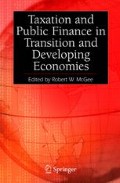An earlier version of this chapter was published in the Journal of Accounting, Ethics & Public Policy 6(2): 167-186 (2006).
Access this chapter
Tax calculation will be finalised at checkout
Purchases are for personal use only
Notes
- 1.
There are today some political theorists and legal scholars who are intent on reintroducing just this rationale for taxation, claiming that individual rights are grants from the government, not based on human nature, having no pre-political foundation. See, for example, Stephen Holmes and Cass Sunstein, The Cost of Rights, Why Liberty Depends on Taxes (New York: W. W. Norton, 1999), and Liam Murphy and Thomas Nagel, The Myth of Ownership (New York: Oxford University Press, 2002).
- 2.
August Comte, The Catechism of Positive Religion (Clifton, NJ: Augustus M. Kelley Publ., 1973), pp. 212-230.
- 3.
See, for example, Tibor R. Machan, "Dissolving the Problem of Public Goods: Financing Government Without Coercive Measures," in T. R. Machan, ed., The Libertarian Reader (Lanham, MD: Rowman & Littlefield, 1982), pp. 201-208, and Ayn Rand, "Government Financing in a Free Society," in E. S. Phelps, ed., Economic Justice (Baltimore: Penguin Books, 1973), pp. 363-367.
- 4.
(New York: Signet, 1996), p. 72. Perhaps "servant" is misleading-more on the order of a hired professional, like a dentist or attorney. Government is an organization for the purpose of rights protection, as medicine is for health protection or education is for advancement of knowledge. All are to benefit human beings who employ their professionals.
- 5.
The theory that people will tolerate considerable taxation before they revolt is supported by ordinary psychology. They will do the same with out and out burglary, for a while, after which they will stop producing unless it is stopped. It is no argument in support of taxation that many do not take to the streets about it-often it simply doesn't pay to protest wrong-doings.
- 6.
We do not, however, need to consent to others defending themselves from aggressors; so a constitution that consists primarily of policies that protect individual rights does not require universal consent, on the consent needed to provide it with sufficient power to oppose crime. See, for more along these lines, Randy E. Barnett, Restoring the Lost Constitution: The Presumption of Liberty (Princeton, NJ: Princeton University Press, 2004).
- 7.
For a fuller discussion of these points, see Tibor R. Machan, Generosity: Virtue in Civil Society (Washington, DC: Cato Institute, 1989).
- 8.
Op. cit., Murphy and Nagel, The Myth of Ownership.
- 9.
Joel B. Slemrod, Does Atlas Shrug? The Economic Consequences of Taxing the Rich (Cambridge, MA: Harvard University Press, 2000).
- 10.
Frederick Bastiat, "What Is Seen and What Is Not Seen," in Selected Essays on Political Economy, George B. de Huszar, ed. (Irvington-on-Hudson, NY: Foundation for Economic Education, 1995), pp. 1-50.
- 11.
Op. cit., Machan, "Dissolving," and Rand, "Government Financing."
Author information
Authors and Affiliations
Editor information
Editors and Affiliations
Rights and permissions
Copyright information
© 2008 Springer Science+Business Media, LLC
About this chapter
Cite this chapter
Machan, T.R. (2008). No Taxation With or Without Representation: Completing the Revolutionary Break with Feudalist Practices. In: McGee, R. (eds) Taxation and Public Finance in Transition and Developing Economies. Springer, Boston, MA. https://doi.org/10.1007/978-0-387-25712-9_3
Download citation
DOI: https://doi.org/10.1007/978-0-387-25712-9_3
Published:
Publisher Name: Springer, Boston, MA
Print ISBN: 978-0-387-25711-2
Online ISBN: 978-0-387-25712-9
eBook Packages: Business and EconomicsEconomics and Finance (R0)

